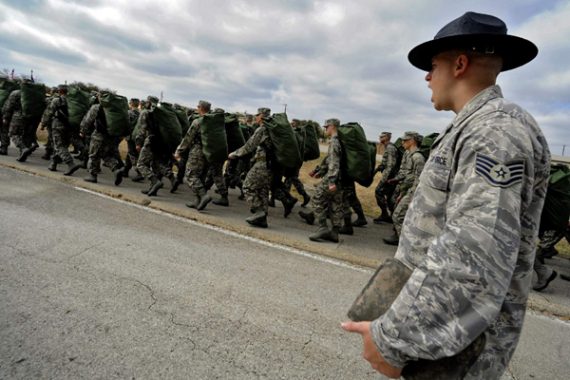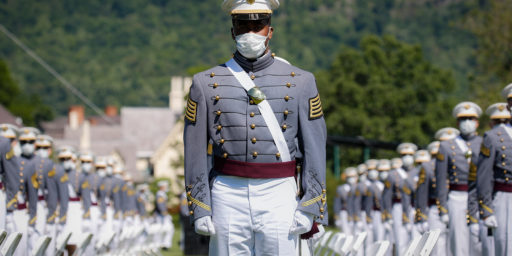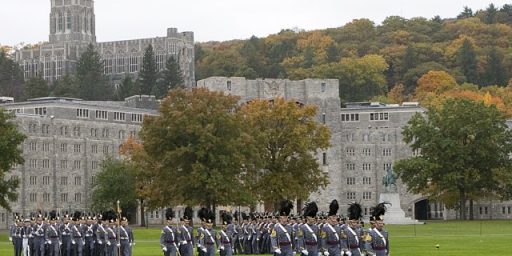Air Force Now Accepting Single Parents, Pregnant Women
The Air Force will now allow pregnant women and single parents to join.
The Air Force will now allow pregnant women and single parents to join.
Air Force Times (“Air Force Opens Doors To Single Parents, Pregnant Women“):
Aspiring airmen who are single parents or the spouses of military service members will be able to join the Air Force under a policy change announced Wednesday.
“It’s important for us to attract the highest caliber men and women to serve in today’s Air Force,” said Brig. Gen. Gina Grosso, director of force management policy. “These policy changes open our doors to more individuals who are highly qualified, but whose family obligations would have previously disqualified them.”
The Air Force will now allow single parents and parents with military spouses, who have up to three children, to enter officer training school, as long as they have an approved care plan for their children. All applicants who have one or two children — but not more — under the age of 18 who cannot care for themselves also will be able to enlist with an approved child care plan.
Cadets with dependents who are single parents or are married to military spouses also now may sign contracts to join the Air Force’s Reserve Officer Training Corps with an approved child care plan. There is no limit on dependents for ROTC cadets, and cadets who are married to civilian spouses do not have to submit a child care plan.
The Air Force also is changing its pregnancy policy for Officer Training School and Military Training School. Trainees will now be allowed to return to their programs after pregnancy upon receiving medical clearance. ROTC cadets can be commissioned and proceed to follow-on training once they are cleared to do so by a medical authority, the Air Force said.
While I support the general trend of making military life more family friendly, it’s hard to make an argument for bringing in new officers whose priorities are divided. While families and children are a part of the human condition that the military has learned to work with, even considering them a support base for the troops, there’s a good reason that we’ve preferred unencumbered junior officers and enlisted personnel. The transition to military life is arduous enough when fully focused on that task.
Two decades ago, Marine Corps commandant Carl Mundy issued an edict banning the enlistment of married recruits. His boss, Secretary of Defense Les Aspin, overturned the order “within hours” after a predictable backlash. But Mundy’s motivation was logical.
Mundy said that 40 percent of Marines on their first enlistment are married and are bearing the brunt of a fierce schedule of overseas deployments that would put an enormous strain on more mature married personnel, much less on an 18- or 19-year-old Marine with a teenage spouse.
“We keep them in high motion a lot, sometimes nine months out of the year,” Mundy saaid.
While some Marines were critical of the way Mundy has tried to come to grips with the problem, they all agreed difficulties exist.
The number of married Marines on their first enlistment reportedly has been increasing about 10 percent every five years. As a result, unit commanders have been faced with an increasing number of personnel problems, including financial hardships, domestic violence and a soaring divorce rate.
A lieutenant colonel who requested anonymity said, “Our platoon leaders are just overwhelmed with a large number of young Marines with family problems. You have a situation where kids are having kids.”
Obviously, the Corps adapted to that reality. But that mostly meant accepting the problems as part of the package. And having a spouse at home is far less demanding than having an infant with no spouse. It’s true that our troops deploy to war zones all the time leaving pregnant wives and small children behind. But leaving the kid with friends or relatives is a different thing altogether.
This seems a particularly odd change to make at a time when we’re going to not only start taking in fewer new officers and recruits but forcing out many veterans of our wars in Iraq and Afghanistan who would prefer to continue to serve. Apparently, it was motivated by one egregiously handled case:
Air Force spokeswoman Laurel Tingley said the case of Rebecca Edmonds, an aspiring nurse who was kicked out of the Air Force in 2011 when she became pregnant before being commissioned as an officer, prompted the service to re-examine its rules.
Edmonds discovered she was pregnant in March 2011, a few weeks before her graduation, her attorney, Daniel Conway, said. She was commissioned that July and reported to her nursing transition orientation program, where she reported her pregnancy. Soon afterward, Air Force ROTC began investigating her, concluded she was fraudulently commissioned, and summarily discharged her as an airman basic. The Air Force also billed her about $90,000 for her scholarship.
Now, obviously, charging Edmonds with fraud and billing her for the cost of her education was boneheaded. But that doesn’t mean that it made sense for the Air Force to commission a single, pregnant woman as a second lieutenant.







Meh. I don’t think this will amount to a whole lot. There are already plenty of servicemembers with Dependent Care Plans in place. And it’s not like anyone wishing to enlist doesn’t know what that means, not after a decade of wars.
Besides, there will probably be relatively few enlistees or cadets who meet these conditions anyway.
@Mikey: It’s probably true that the numbers well be small, although that works both ways–it won’t substantially broaden the talent pool, either, and comes with a large downside risk. It would have made more sense to make pregnancy and/or single parenthood waiverable conditions, wherein the Powers That Be could grant exceptions for extraordinary candidates.
@James Joyner:
Perhaps they have done just that with the requirement of an approved child care plan? Nothing in the article about what that plan must look like, and the requirements may indeed be onerous.
My concern is around policies that require kids who serve together to get married if they wish to stay within 10,000 miles of each other. Softening that policy would likely result in fewer teen marriages and subsequent babies as people could petition to be stationed together, come what may. They may end up going together to Fargo, rather than Honolulu, but when you face shipping out in 3 days it’s very romantic to just get married and tie the commander’s hands.
@James Joyner:
I don’t know about the Army, but we had a saying in the Air Force: “everything is waiverable, you just have to get the right officer to sign it.”
Your other point is well taken, but even so, I’m not sure the downside risk is all that significant, because they’re just extending conditions already available to the force in general. Although it’s true the benefit might not outweigh the risk, even if the risk is relatively small.
@Tony W:
Here’s some light reading for you…
I took off the uniform in ’68 so in the present context I am aware that I don’t know nuthin’. But the way it used to be in the USAF was that most enlistments were served at large bases and for long tours. If things haven’t changed too much, maybe this is a pretty simple adjustment to reality.
But as I was contemplating the Original Post, I had this polically incorrect image of a female AirForce office flying a Predator/Hellfire platform while having terrible pre-menstrual issues and…. Well, I had to laugh. Shame on me.
I’m wondering if someone was tasked with figuring out how to reduce divorce rates among service members, and came up with this as a way of finessing the metrics.
On the surface, this doesn’t seem like a great idea, and I have neither the expertise nor the inclination to understand it better. Hopefully, if it is as terrible an idea as it sounds, the parents will have more common sense than the Air Force.
I guess I don’t see this as a major issue. The family care plans that are required a pretty comprehensive.
Greetings:
Let the hollowing out continue.
I’m sure there are even more angels out there who want to dance on the head of the social justice pin. And I’m sure all those Dependent Care Plans, with the appropriate Nihil Obstat in place will come true because that’s how social justice always works.
Ahhhh, the all-volunteer military. A gift that keeps on giving… more and more away.
@11B40: While I too vehemently oppose the all-volunteer military, I’m not seeing how the threat of draft for every person of a certain age solves the problem of accommodating those with (or about to be with) children.
Back in my father’s day, one got a draft exemption for being married, having children, being in college, etc. I suppose we could go back to a system that selected only men for duty, and allowed our immediate former president hold a no-show Reserves job instead of fighting in Vietnam, but more likely is that we’d draft a military that looks an awful lot like the one that serves today.
Which means we’d still be having this discussion.
@Tony W:
Greetings, Tony W:
Well, let me start where I usually start. My main problem with our “all-volunteer military” is the implicit, and I have never seen it addressed explicitly, message that our menfolk don’t have an individual responsibility (however archaic that word may now be) to defend our country and our culture. This concept has been implicitly set in progressive stone since it was handed down to us from Mount Washington DC in about 1973.
I did my military service back in the late ’60s early ’70s and I will not argue that there haven’t been plenty of social changes in the interim in terms of birthing and cohabitating and whatnoting. But, I don’t share the belief that the all-volunteer policy is working any better than the tried and true draft would have. Even while stacking our military decks with 15% or so females, we ran perilously short of available manpower during the dark days of Iraq. But, of course, that lesson was first overlooked and subsequently ignored.
And If I may harken back a bit, that joy of my youth that was the military draft was actually a six-year commitment, two years active duty, two years active reserve, (like that former president you mentioned as opposed to the president that formered him) and two years of inactive reserve, so there were large numbers of recently trained draftees available for that kind of situation.
This policy change, accommodating those with or about to be with children, seems to me to based on some kind of recruitment shortfall or on the general progressive proclivity to turn everything they can into a social justice welfare program. Militarily, it’s like digging a hole into which to fall.